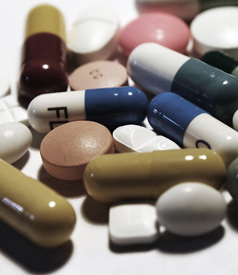Bangkok, Thailand — Before any pill reaches the pharmacy shelf, it must first pass through a gauntlet of human guinea pigs: the “clinical subjects” paid to take trial drugs so specialists can observe their symptoms.
But like call centers and high-end hospitals, drug trials too are rapidly shifting to India and Asia with Thailand as the region’s favored frontrunner.
For Western pharmaceutical giants such as Pfizer and GlaxoSmithKline, Asia offers a glut of people willing to accept less money for testing out trial medicines. Softer regulation is another big draw, as are improvements in Asian hospitals’ facilities and an increase in Western-educated doctors.
How Fast is Asia’s Drug Trial Industry Growing?
Very fast. Just eight years ago, only 6 percent of the world’s drug trial patients were tested in Asia and India. The figure is now 11 percent, according to CMR International, which produces the leading study on pharmaceutical research.
In that same eight-year stretch, North America’s share of patients dropped from 53 to 32 percent. Asia was mostly responsible for eroding that share, though the number of patients increased slightly in Europe and Latin America.
While China and Japan conduct the most studies, Thailand has become the region’s most desirable location, according to the CMR report. In the past year alone, its ongoing studies have jumped 36 percent to 800 open trials.
What do Drug Trial Volunteers Have to Do?
Their experiences will vary wildly depending on the trial. One typical test, which measures the speed of blood stream absorption, can require volunteers to consume a pill and submit to more than 35 blood draws throughout a weekend. Two weekends of testing, in the United States, would pay approximately $1,000. Volunteers in Thailand would more likely receive less than $50.
Other disease-specific trials test experimental drugs on patients over a series of weeks or months. The “payment” in these studies typically isn’t cash but rather the promise of cutting-edge treatment.
Generally, a study conducted in Thailand is about one-third the cost of a U.S.-based study, said Sasitorn Kittivoravitkul, director of Bangkok clinical study firm Bio-Innova & Synchron.
Why is Thailand Now Favored by Drug Firms?
Its people are largely healthy and eligible for testing thanks to a 90-cents-per-visit public healthcare scheme. Its hospitals are staffed by English-speaking physicians and specialists educated abroad.
There’s also no single Thai regulatory body responsible for approving trials — both a convenience and source of frustration for pharmaceutical firms.
In a departure from Western standards, trial supervisors don’t have to report what the industry calls “Unexpected Suspected Adverse Drug Reactions” — meaning worrisome side-effects of prototype drugs don’t have to be documented. (Draft legislation could change this.)
“Thailand’s leading position is largely due to the lack of uniform legislation regarding clinical trials,” according to Paul Russell, who monitors regulatory law for the Bangkok-based Tilleke & Gibbins law firm. “Since there is no central regulation, companies feel more comfortable conducting clinical trials in Thailand.”
Thailand’s favored status is no accident. The Thai public health ministry and the Board of Investment — a state-owned arm devoted to luring in foreign investors — have worked in synch to court Western pharmaceutical giants. The government continues to lure in foreign pharmaceutical firms and expects its bio-technology industry to produce $882 million in revenue by 2011.
What are Thailand’s Drawbacks?
Slippery legislation can also make trouble for Big Pharma. Major drug firms despise “compulsory licensing,” a government’s decision to ignore copyright and cheaply mass-produce a drug in the name of improving public health. Thailand hijacked patents for HIV and heart medicines in 2006 after a military coup installed a nationalist leadership willing to upset major drug firms.
This outraged the Pharmaceuticals and Manufacturers of America, a D.C. lobby that claimed the patent violations caused a “a very unpredictable business environment” that undermines positive perceptions of Thailand’s emerging drug trials industry.
What’s Next for Drug Trials in Asia?
Many studies in Thailand involve testing “bio-equivalence,” which mostly involves ensuring generic drugs work as well as the more-expensive drugs they’re meant to imitate. The process is much less scientifically strenuous than testing a totally original drug. So far, there’s still too little infrastructure or stability to invite a major wave of higher-end drug trials.
This presents an opportunity for India, which is beginning to attempt more sophisticated, high-risk trials. India shows the “strongest inclination to invest in innovative research & development,” according to the CMR report. Still, excluding Japan, India and the rest of Asia receive less than 1 percent of pharmaceutical research expenditure worldwide.
Trump is silencing political dissent. We appeal for your support.
Progressive nonprofits are the latest target caught in Trump’s crosshairs. With the aim of eliminating political opposition, Trump and his sycophants are working to curb government funding, constrain private foundations, and even cut tax-exempt status from organizations he dislikes.
We’re concerned, because Truthout is not immune to such bad-faith attacks.
We can only resist Trump’s attacks by cultivating a strong base of support. The right-wing mediasphere is funded comfortably by billionaire owners and venture capitalist philanthropists. At Truthout, we have you.
Truthout has launched a fundraiser to raise $38,000 in the next 6 days. Please take a meaningful action in the fight against authoritarianism: make a one-time or monthly donation to Truthout. If you have the means, please dig deep.
